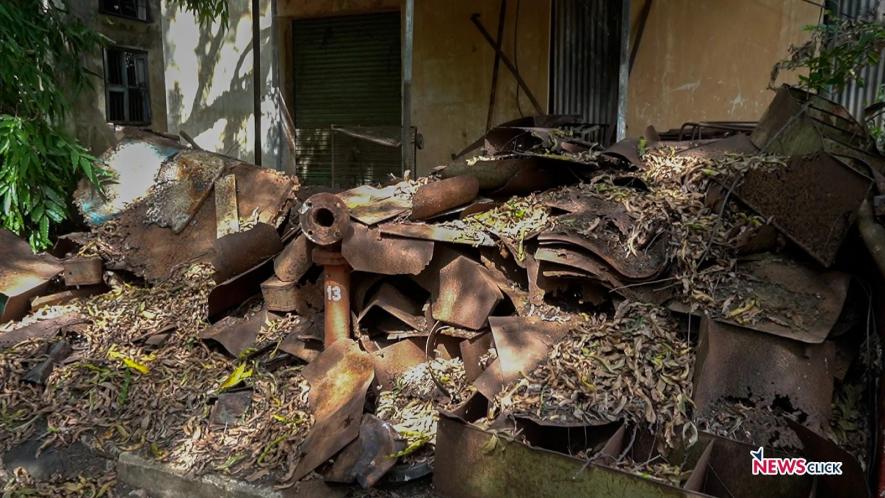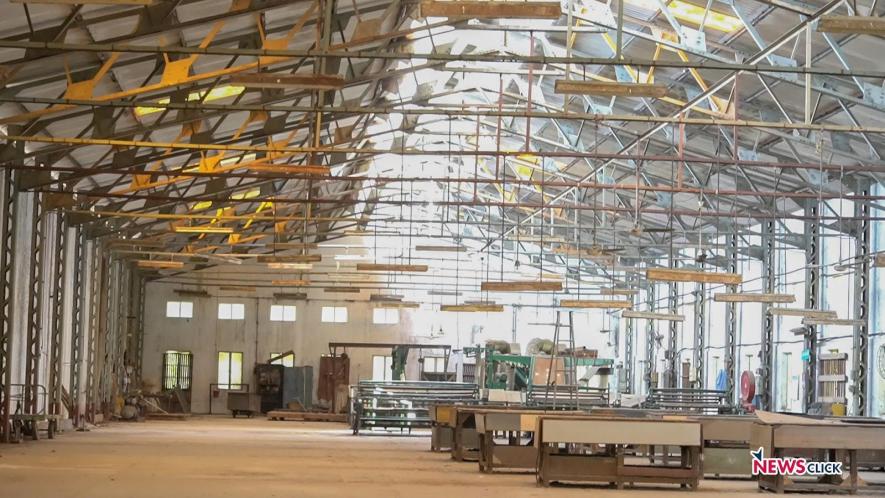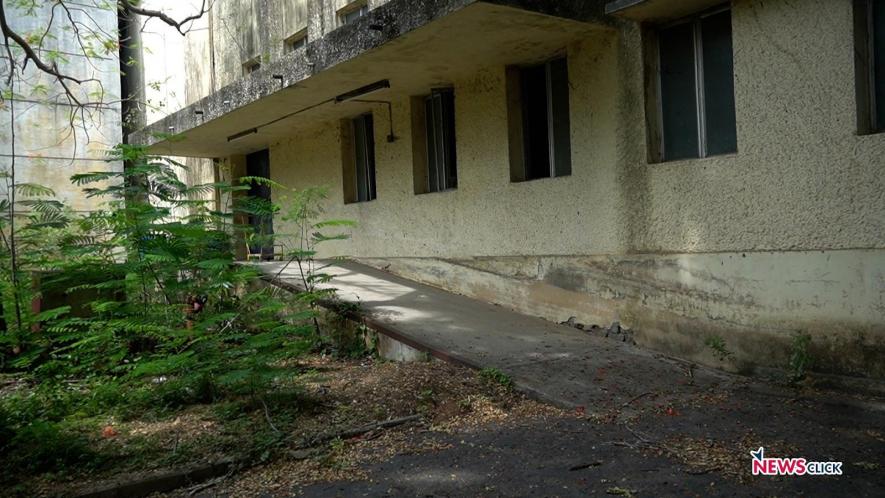Puducherry’s Grand, Century-Old Textile Mills Shut Since 2020

Entrance of Unit A of the AFT mill in Puducherry.
Puducherry was once the hub of cotton textiles. The district housed three famous textile mills that employed more people than the Union Territory’s (UT) government did.
The Swadeshi Cotton Mill was established as early as 1828, while the Bharathi Textile Mill was started in 1892. After the French left, both mills were taken over by the National Textile Corporation until the Puducherry government took them over in 2005. However, both mills were announced shut in September 2020.
The third firm, Rodier Mill, which had its central office in London, was started in 1898. It was renamed Anglo-French Textiles (AFT) in 1955 and ran till 1983 when the owner of the mill decided to lock it down. The Puducherry government took over the mill in 1986 and ran it till Cyclone Thane hit the UT in December 2011.
NewsClick visited Puducherry and interacted with former mill workers to learn why the once popular textile mills shut and what this means to the UT.
HIT BY LIBERALISATION
The century-old mills accumulated losses in the late twentieth century and the Puducherry government tried to keep them running by pumping money into them to pay employees. Workers’ unrest was cited as a prime reason for these losses. However, former employees and trade unionists have an alternate version to share.
Puduvai Mill Workers’ Union states that the mills were in fact reaping profits, but mismanagement and corruption led to the losses. It says the liberalisation policies of the Congress-led government in the 1980s were instrumental to it.

Machine scrap within the shut AFT mill premises
Subramaniyan, the former general secretary (1986 to 1992) of the union, said that during the Rajiv Gandhi-led government, a policy decision was passed to fully privatise cotton mills. However, that was not easy because the mills were running on profits.
“The mills got international orders, and they brought in foreign exchange for the country. The AFT mill even received the President's award. Moreover, the water in Puducherry was good for cloth dying, and it even received a medal for quality. However, the management aided corruption while buying raw material, machinery and spare parts, which led to losses” he said.
The mills were showing losses in their balance sheet, and the Centre had given loans to sustain them. In this manner, due to the pressure of the Union government, the mills were massacred little by little, he added.
“In a study carried out by South Indian Textile Research Association (SITRA), an organisation based in Coimbatore, it was found that the loss due to workers’ protest was minimal,” he said.
AFT MILL
Anglo French Textiles (AFT) was a private mill, and in its heyday, it was the single-largest factory of Puducherry. It was considered the backbone of the UT’s economy, and it gained recognition in European markets.

The unkempt campus of the AFT mill
In 1983, when the owner of the mill decided to lock it down, the Government of India took possession of the mill under the Acquisition and Transfer of Textile Undertaking Act 1985 and handed it over to the Government of Puducherry.
AFT shut in 1982 following worker unrest, which lasted four years, till the mill reopened in 1986. The mill was an integral part of the culture of the Puducherry district.
Subramanian said, “The protests became a mass movement. If Rajini or Kamal fan clubs held a meeting, they would pass a resolution to reopen the Rodier mill. It created a big impact in Puducherry politics whereby the ruling party realised that they could win the next elections only if the mill was reopened.”
Elumalai, who retired from the AFT after working there for 41 years, said “Back then, the mill workers got more salary than the government employees. I am very upset that the mill is shut because we ran out of employment opportunities for the future generations.”
Murugan, who was laid-off from AFT mill, said “I had joined the mill in 1990. I have service till 2027 (he joined at the age of 23). But they closed the mill in 2012, following the Thane cyclone”.
He said “When the mill was not running, outsiders entered the premises to dismantle the machinery and took them out in truckloads. The management were mute spectators. Apparently, the chairman had ordered the removal of machinery. Machinery worth crores of rupees were lost”.

AFT mill without the machines
“They said they will settle our balance within three months, but we have received nothing in the past two years”.
Murugan was working in the weaving department of AFT. Since he lost his job, he set up a tea shop opposite the mill.
Although the mill has not been functioning since 2012, it was formally announced shut only in April 2020.
When AFT mill shut, it had only 600 workers, while in its heyday, it employed 16,000 workers.
RELUCTANT TO REOPEN MILLS
Two years after all three mills were shut, Puducherry residents still hope that the mills will be reopened and pave the way for employment opportunities.
“Even today, at a minimum cost of Rs 500 crore, around 10,000-12,000 people can be given employment. But a Legislative Assembly building of Rs 300 crore is sanctioned by the Central government for merely 33 MLAs to sit and talk,” said Subramaniyam.

The empty AFT mill building, where thousands worked earlier
“When we appeal to the Chief Minister, Rangasamy, he asks ‘where is the money?’ The government is borrowing money from the World Bank for many schemes. But there’s no money for these mills that attract foreign exchange and are intertwined with the culture and economy of Puducherry” he said.
“Moreover, the raw materials market, like cotton cultivation, also improves and develops the rural economy. The industries that sell the textile will also develop. tailoring, dyeing and other micro, small and medium enterprises,” added Subramanian.
Balachandran, a former AFT mill worker, said, “We are in this situation due to the reluctance of the government. We really hope they open the mills.”
Get the latest reports & analysis with people's perspective on Protests, movements & deep analytical videos, discussions of the current affairs in your Telegram app. Subscribe to NewsClick's Telegram channel & get Real-Time updates on stories, as they get published on our website.
























